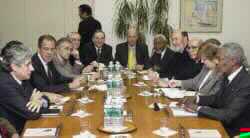Gulf States Want Big U.N. Role in Iraq
08/04/2003| IslamWeb
 Foreign ministers of the six Arab states in the Gulf called Monday for a national postwar government and a major United Nations role in postwar Iraq. The members of the Gulf Cooperation Council "reaffirm that it is important for Iraqis to run all the affairs of their country," said Abdulrahman al-Attiyah, secretary-general of the loose political and economic alliance, at the end of a meeting of GCC foreign ministers.
Foreign ministers of the six Arab states in the Gulf called Monday for a national postwar government and a major United Nations role in postwar Iraq. The members of the Gulf Cooperation Council "reaffirm that it is important for Iraqis to run all the affairs of their country," said Abdulrahman al-Attiyah, secretary-general of the loose political and economic alliance, at the end of a meeting of GCC foreign ministers.
In a closing statement read on Kuwait Television, he said it was "time the international community represented by the United Nations moves quickly and effectively to guarantee the future of Iraq, its sovereignty, the unity of its territory and the safety of its people."
Washington has yet to announce the shape of a postwar government in Iraq. An interim administration is expected to be led by Jay Garner, a retired U.S. general.
At the outset of the meeting, Kuwait - which has sent water, food and medical supplies across its northern border in recent weeks - urged other Gulf States to increase aid to Iraqis suffering from the war.
Kuwait, which was invaded in 1990 by Saddam Hussein, is looking forward to "a free Iraq that would respect its neighbors," Sheik Sabah Al Ahmed Al Sabah, Kuwait's foreign minister, said in his opening speech.
"We had hoped to see a sacrifice by the Iraqi president, not victims from the Iraqi people," he said, suggesting that Saddam should have heeded the United Arab Emirates' call to step down and avoid war.
Kuwait called Monday's meeting to discuss the war's developments and effects on GCC members, including Saudi Arabia, the United Arab Emirates, Bahrain, Qatar and Oman.
Oil-rich Kuwait has been the main launch pad for the war on Iraq and the target of some 19 Iraqi missiles, most of which were intercepted by Patriot missiles.
Kuwait feels isolated among Arabs because of its support for the war and close ties with America, which led a coalition to oust occupying Iraqi forces from Kuwait during the 1991 Gulf War.
Kuwait has been disappointed with the lack of quick condemnation from Arab states and friendly nations of the Iraqi missile attacks.
Qatar's foreign minister, Hamad bin Jassem, told the meeting that GCC states fully support Kuwait in all measures it takes to safeguard its security
Annan Seeks Security Council Iraq Meeting
In New York, Laying claim to "an important role" for the United Nations in postwar Iraq, Secretary-General Kofi Annan on Monday stressed that only the world body can bring legitimacy to the work of rebuilding the nation.
Annan chose the day that President Bush and British Prime Minister Tony Blair opened talks in Northern Ireland on postwar Iraq to introduce the Security Council to Rafeeuddin Ahmed, his new special adviser on post-conflict issues.
The Bush administration says the U.S.-led coalition fighting in Iraq takes the lead in running and rebuilding Iraq while the European Union and Washington's closest ally, Britain, are pushing for greater U.N. involvement.
Those divisions remained after Annan's 90-minute meeting with ambassadors from the 15 nations on the council, though they agreed that any new U.N. role in Iraq would require a new Security Council resolution.
PHOTO CAPTION
U.N. Secretary-General Kofi Annan, right, meets with members of the U.N. Security Council to discuss the reconstruction of post-war Iraq at United Nations headquarters, Monday, April 7, 2003. (AP Photo/The United Nations, Sophie Paris/HO)
www.islamweb.net
